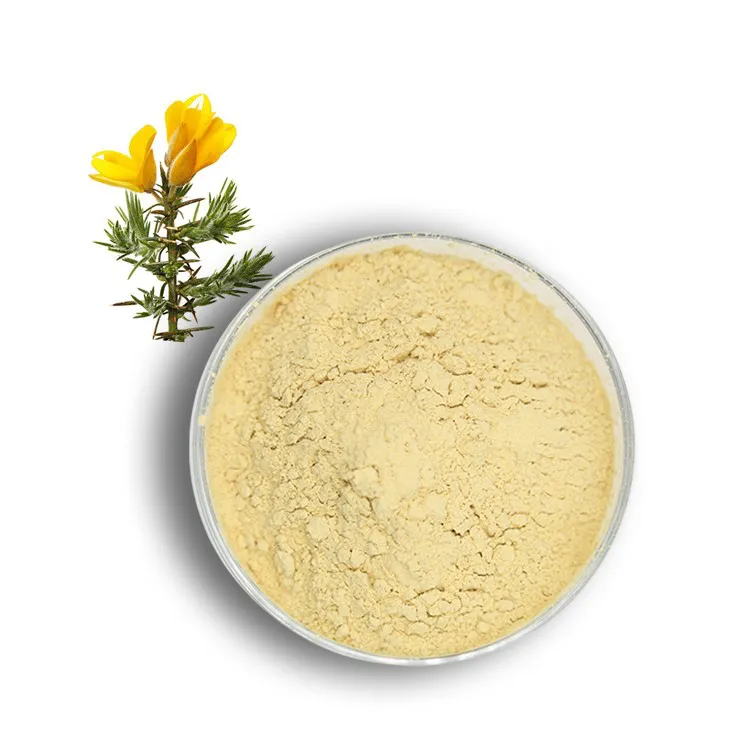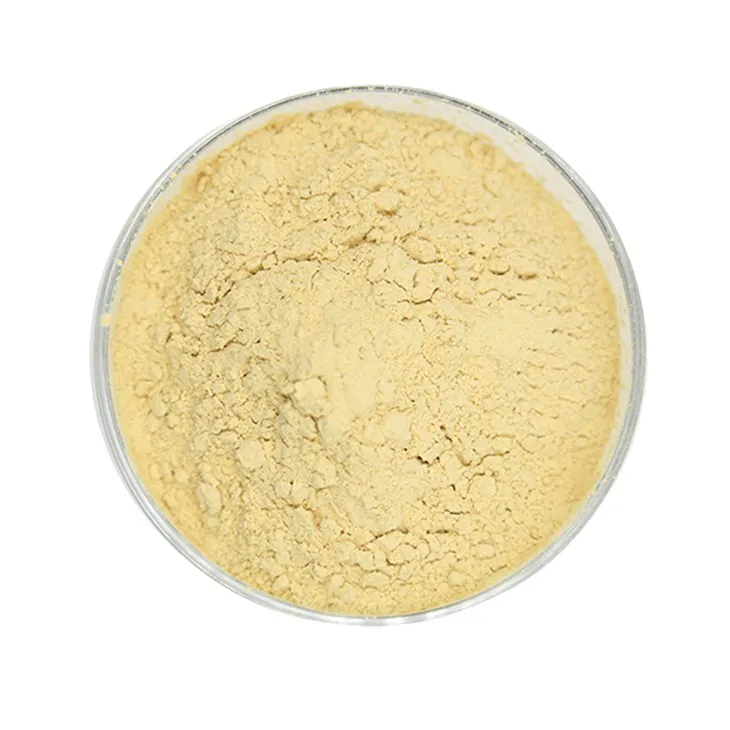- 0086-571-85302990
- sales@greenskybio.com
100% Pure Organic Genistein.
2024-12-02

1. Introduction to Genistein
Genistein, in its pure and organic form, is a compound that has been the focus of extensive research in recent years. It is a type of isoflavone, which is a class of phytoestrogens found predominantly in plants. These phytoestrogens have a chemical structure similar to that of estrogen, a hormone found in humans and animals.
The fact that Genistein is 100% pure and organic adds to its allure. Pure in this context means that it is free from contaminants and other substances that could potentially interfere with its activity. Organic implies that it is sourced from plants that have been grown without the use of synthetic pesticides, fertilizers, or genetically modified organisms (GMOs). This not only makes it a more natural and potentially safer option but also has implications for the environment and sustainability.

2. Biological Significance of Genistein
2.1 Cell Signaling and Cancer Prevention
One of the most studied aspects of genistein's biological activity is its interaction with cell signaling pathways in relation to cancer prevention. Genistein has been shown to modulate cell signaling in several ways. For example, it can interact with receptors on the cell surface and affect the intracellular signaling cascades that are involved in cell growth, proliferation, and survival.
In the context of cancer, genistein's ability to influence gene expression is of particular importance. It can act as an epigenetic modulator, meaning it can change the way genes are regulated without altering the DNA sequence itself. In hormone - related cancers such as breast cancer, genistein may interfere with the action of estrogen. Estrogen is known to play a role in promoting the growth of breast cancer cells in some cases. Genistein, with its estrogen - like structure, can bind to estrogen receptors and either block or modulate the effects of estrogen, thereby potentially inhibiting the growth of cancer cells.
Research has also suggested that genistein can target specific oncogenes and tumor suppressor genes. Oncogenes are genes that, when mutated or over - expressed, can promote cancer development. Tumor suppressor genes, on the other hand, are genes that normally prevent cells from becoming cancerous. Genistein may be able to regulate the expression of these genes in a way that favors cancer prevention. For instance, it may down - regulate the expression of oncogenes and up - regulate the expression of tumor suppressor genes.
2.2 Other Cellular Mechanisms
Aside from its role in cancer prevention, genistein also interacts with other cellular mechanisms. It has been shown to have antioxidant properties. Antioxidants are substances that can neutralize free radicals, which are highly reactive molecules that can cause damage to cells and their components such as DNA, proteins, and lipids. By scavenging free radicals, genistein can help protect cells from oxidative stress, which is implicated in a variety of diseases including aging - related disorders, cardiovascular diseases, and neurodegenerative diseases.
Genistein also plays a role in cell cycle regulation. The cell cycle is a series of events that a cell goes through as it grows and divides. Dysregulation of the cell cycle can lead to abnormal cell growth and potentially cancer. Genistein can interact with proteins involved in the cell cycle checkpoints, ensuring that cells progress through the cycle in a normal and controlled manner. If cells have damaged DNA or other abnormalities, genistein may help to halt the cell cycle and initiate repair mechanisms or, in some cases, programmed cell death (apoptosis) to prevent the spread of damaged cells.

3. Ecological Significance of Genistein
3.1 Role in the Ecosystem
The plants that produce genistein are an integral part of a complex ecosystem. These plants provide food and habitat for a variety of organisms. For example, many insects are attracted to the flowers of plants that contain genistein, such as soybeans. Bees, for instance, are important pollinators that visit these flowers in search of nectar. In doing so, they transfer pollen from one flower to another, facilitating plant reproduction.
Moreover, the seeds of these plants are a source of food for birds and small mammals. This creates a web of interactions within the ecosystem. The presence of genistein - producing plants can also influence the composition of the soil microbiome. The roots of these plants excrete various substances, including genistein, which can affect the growth and activity of soil microorganisms. Some soil bacteria and fungi may be able to break down genistein, releasing nutrients back into the soil that can be taken up by other plants.
3.2 Sustainable Agricultural Practices
The cultivation of organic sources of genistein promotes sustainable agricultural practices. Sustainable agriculture aims to meet the present food and fiber needs while protecting the environment and ensuring the long - term viability of agricultural systems.
Organic farming methods used for growing genistein - producing plants avoid the use of synthetic pesticides and fertilizers. This reduces the potential for chemical runoff into water bodies, which can have harmful effects on aquatic ecosystems. It also helps to maintain soil health. Organic matter in the soil is preserved and enhanced, which improves soil structure, water - holding capacity, and nutrient availability. This, in turn, benefits the growth of plants and reduces the need for additional inputs.
Furthermore, organic farming encourages biodiversity. By creating a more natural and less chemically - intensive environment, a wider range of organisms can thrive. This includes beneficial insects that can act as natural pest controllers, reducing the need for chemical pesticides. Birds and other wildlife are also more likely to be present in organic farms, contributing to a more balanced and sustainable ecosystem.

4. Nutraceutical Perspective of Genistein
4.1 Dietary Supplements
From a nutraceutical perspective, pure organic genistein is a valuable addition to dietary supplements. In today's health - conscious society, many people are looking for natural ways to support their overall well - being. Genistein - based supplements can be an attractive option for those who want to take advantage of its potential health benefits.
These supplements can be formulated in different ways. They may be available as capsules, tablets, or powders. The dosage of genistein in these supplements can vary, depending on the intended use and the target population. For example, some supplements may be designed for general health maintenance, while others may be targeted at individuals with a higher risk of certain diseases such as cancer or heart disease.
However, it is important to note that the use of genistein supplements should be done under the guidance of a healthcare professional. While genistein has shown potential health benefits, excessive intake may also have potential risks. For instance, high levels of genistein may interact with medications or may have hormonal effects that need to be carefully monitored.
4.2 Incorporating Genistein into the Diet
Genistein can also be incorporated into the diet through foods that are rich in this compound. Soy products are one of the main sources of genistein. This includes soybeans, tofu, soy milk, and tempeh. These foods have been part of the traditional diet in many Asian countries for centuries and are now becoming more popular in Western countries as well.
Other plant - based foods may also contain genistein, although in lower amounts. Legumes such as chickpeas and lentils, as well as some nuts and seeds, may have trace amounts of genistein. Incorporating a variety of these foods into a healthy diet can provide a natural source of genistein without the need for supplements.
When considering dietary sources of genistein, it is also important to take into account the overall diet quality. A diet rich in fruits, vegetables, whole grains, and lean proteins, along with genistein - containing foods, is likely to provide the best overall health benefits. This is because these different food groups work together to provide a wide range of nutrients, vitamins, and minerals that are essential for good health.

5. Conclusion
In conclusion, 100% pure organic genistein has significant potential in multiple aspects. Biologically, it offers promising possibilities in cancer prevention and in interacting with various cellular mechanisms to promote health. Ecologically, the plants that produce it are important for the ecosystem, and its organic cultivation promotes sustainable agricultural practices. From a nutraceutical perspective, it can be a valuable addition to dietary supplements and a natural component of a healthy diet.
However, more research is still needed to fully understand the long - term effects of genistein, especially in relation to its use in supplements and high - dose applications. As with any compound, a balanced approach is necessary to ensure that its potential benefits are maximized while minimizing any potential risks.
FAQ:
What is 100% pure organic Genistein?
100% pure organic Genistein is a compound. It is in its purest form and is obtained through organic sources. It has various biological, ecological, and nutraceutical properties.
How does Genistein interact with cellular mechanisms?
Genistein interacts with various cellular mechanisms by influencing cell signaling pathways. It can modulate certain genes, which may play a role in processes like inhibiting the growth of cancer cells.
What role does Genistein play in cancer prevention?
Research suggests that Genistein can influence cell signaling pathways related to cancer prevention. In particular, it may play a role in inhibiting the growth of cancer cells, especially in hormone - related cancers such as breast cancer.
Why is the cultivation of organic Genistein sources important for the ecosystem?
The plants that produce Genistein are part of a complex ecosystem. The cultivation of organic sources of Genistein promotes sustainable agricultural practices and encourages biodiversity as organic farming methods are more friendly to the environment, supporting a wide range of insects, birds, and other organisms.
How can pure organic Genistein be incorporated into a healthy lifestyle?
Pure organic Genistein can be easily incorporated into a healthy lifestyle. It can be consumed through dietary supplements or by eating foods that are rich in this compound.
Related literature
- The Role of Genistein in Cancer Prevention: A Review"
- "Genistein and Cellular Signaling: Current Understanding"
- "Organic Genistein Sources and Sustainable Agriculture"
- ▶ Hesperidin
- ▶ Citrus Bioflavonoids
- ▶ Plant Extract
- ▶ lycopene
- ▶ Diosmin
- ▶ Grape seed extract
- ▶ Sea buckthorn Juice Powder
- ▶ Fruit Juice Powder
- ▶ Hops Extract
- ▶ Artichoke Extract
- ▶ Mushroom extract
- ▶ Astaxanthin
- ▶ Green Tea Extract
- ▶ Curcumin
- ▶ Horse Chestnut Extract
- ▶ Other Product
- ▶ Boswellia Serrata Extract
- ▶ Resveratrol
- ▶ Marigold Extract
- ▶ Grape Leaf Extract
- ▶ New Product
- ▶ Aminolevulinic acid
- ▶ Cranberry Extract
- ▶ Red Yeast Rice
- ▶ Red Wine Extract
-
Tongkat Ali Extract
2024-12-02
-
Tamarind extract powder
2024-12-02
-
White Willow Bark Extract
2024-12-02
-
Feverfew Extract
2024-12-02
-
Rosemary extract
2024-12-02
-
Andrographis Paniculata Extract Powder
2024-12-02
-
Fig Extract
2024-12-02
-
Hericium erinaceus extract powder
2024-12-02
-
Artichoke Extract
2024-12-02
-
Calendula Extract
2024-12-02





















